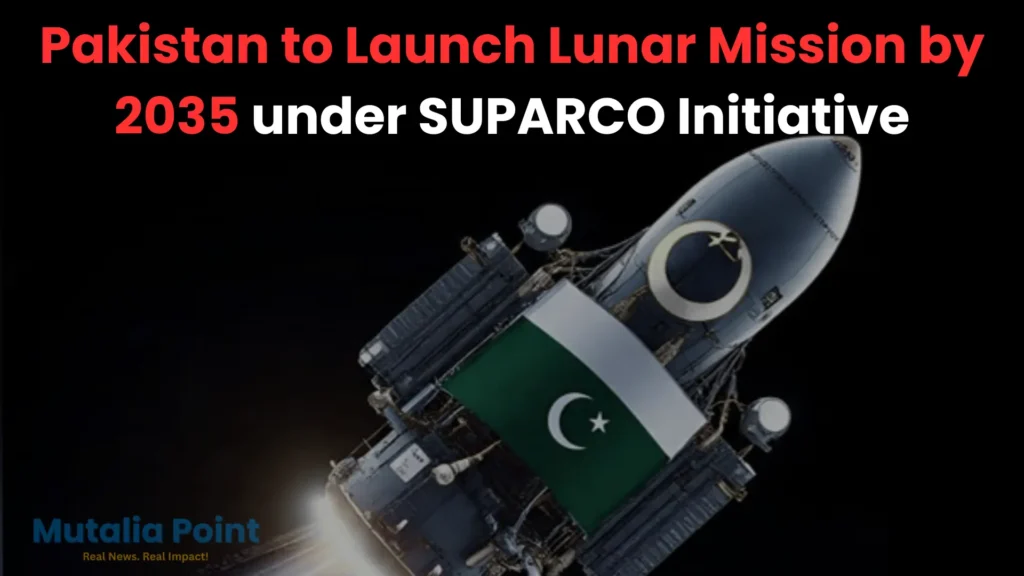Pakistan to launch lunar mission by 2035 — a groundbreaking move announced by Federal Minister for Planning, Development, and Special Initiatives, Ahsan Iqbal, during a key meeting in Beijing with senior Chinese officials. The announcement highlights Pakistan’s increasing ambition in space exploration and scientific advancement, with the lunar mission being led by the country’s national space agency, SUPARCO.
The meeting took place between Ahsan Iqbal and Shan Zhongde, Chairman of the China Atomic Energy Authority and China’s Space Agency. According to an official news release, the dialogue aimed to align bilateral cooperation in space and nuclear technology with Pakistan’s broader development goals. The focus was on reinforcing partnerships that can drive progress in critical sectors like energy, science, climate change, and research.
Pakistan to Launch Lunar Mission by 2035: A New Frontier for SUPARCO
This mission marks a significant milestone for SUPARCO, which has previously collaborated with China on multiple satellite launches. Under the newly energized “Uraan Pakistan” initiative launched by Prime Minister Shehbaz Sharif’s government, Pakistan’s space ambitions are gaining momentum. Ahsan Iqbal noted that beyond satellite projects, the nation is now targeting its first lunar mission by 2035, reflecting a shift towards deeper space capabilities.
Iqbal emphasized that the China-Pakistan Economic Corridor (CPEC) remains a central pillar of bilateral cooperation. Projects such as K-2, K-3, and C-5 nuclear plants are examples of how shared investments have helped ease energy shortages and infrastructure bottlenecks in Pakistan. He also recognized the role of China in enabling Pakistan’s space sector to evolve through both technical and strategic support.
In particular, Iqbal highlighted Pakistan’s plans to send its first astronaut to the Chinese space station by 2026, another major step that underscores SUPARCO’s rapidly expanding role in regional space exploration efforts. The astronaut mission is expected to be a stepping stone towards achieving greater objectives in orbital science and technological innovation.
China has already committed to supporting Pakistan’s aspirations. During the meeting, Chairman Shan Zhongde reaffirmed Beijing’s willingness to assist Pakistan in space-related endeavors. He commended the progress of CPEC and voiced China’s continued support for peaceful nuclear and space technology collaborations with Pakistan.
Meanwhile, Iqbal stressed the need for stronger cooperation in emerging technologies, especially in quantum computing, energy research, and artificial intelligence. He spoke about the establishment of a Quantum Computing Center in Pakistan and called for deeper scientific exchanges between Pakistani institutions like SUPARCO and their Chinese counterparts.
Recognizing the potential of Pakistan’s skilled and affordable workforce, Iqbal advocated for expanding China-Pakistan educational programs to build capacity in advanced space science and engineering. He noted that young Pakistani scientists should be given more opportunities to pursue higher studies in China, particularly in fields related to space and nuclear research.
Pakistan’s commitment to peaceful space exploration was a central theme of the discussions. Iqbal assured that the lunar mission and associated programs would be grounded in the responsible and peaceful use of technology, aligned with global norms and scientific integrity.
As part of a broader national effort, a program has been introduced to align science, technology, and engineering with Pakistan’s economic and strategic development. This vision is not limited to outer space but also encompasses national challenges such as climate change, water scarcity, healthcare, and sustainable energy.
To stay updated on SUPARCO’s plans and space developments, readers can follow the official SUPARCO website or check in with space-focused updates from SpaceNews.
In the global race for space, Pakistan’s announcement to launch a lunar mission by 2035 signifies not only scientific ambition but also a broader commitment to technological self-reliance and international cooperation. With the ongoing partnership between Islamabad and Beijing, the future of Pakistan’s space exploration appears poised for a significant leap forward.















